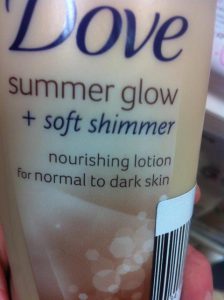by Georgia Luckhurst
I like going into drugstores. The smells of cloying perfume mingling with talcum power strewn floors and aggressive seeming offers shouting at me from posters on the walls (“EVERYTHING MUST GO!!!” and “BUY ONE GET ONE FREE!!!”, usually) are never enough to deter me from heading towards the make-up aisle. I’ve written before for SPARK about my relationship with make-up and how I’ve grown to use it not as a cover but as a form of expression, but if there’s one thing that I resent about the beauty industry, it’s this: the language they use to sell products.
shouting at me from posters on the walls (“EVERYTHING MUST GO!!!” and “BUY ONE GET ONE FREE!!!”, usually) are never enough to deter me from heading towards the make-up aisle. I’ve written before for SPARK about my relationship with make-up and how I’ve grown to use it not as a cover but as a form of expression, but if there’s one thing that I resent about the beauty industry, it’s this: the language they use to sell products.
Words can be powerful: that’s something I’ve always been certain of. Words are responsible for building a person’s confidence, but have the same opportunity to knock it down. Hence why the kind of language adopted by the beauty industry annoys me – not because it is poor syntax (I mean, sometimes it is, but that’s not the problem here) but because it perpetuates the myth that women are born to spend their entire life trying to improve their physical appearance, searching for that elusive “perfection”.
Having gone through my extensive make-up collection, I compiled a list of the most irritating ones:
1) “Leaving skin soft and supple,” found on a tinted moisturizer – generally speaking, skin is soft and supple. That is the point of skin. Everyone gets the occasional spot, I know, but their skin is still essentially soft and supple because that’s the point of our skin: it’s like a sort of rubbery blanket, which generally serves its purpose well as skin – you know, the purpose of keeping our organs inside, and keeping us warm, and acting as a sense organ. Unless this foundation gives my skin the silkiness of velvet crafted by some kind of goddess, I don’t need it.
2) “For the natural look,” found on a foundation bottle – two problems with this one: firstly, it reinforces the idea that too much make-up is in some way shameful, saying “you should always wear make-up and you should feel pressure to wear make-up. But if you were too much make-up, that is cheap and wrong.” Yet sometimes I want to wear too much make-up. Sometimes I want to wear heaps of mascara and eyeliner and lipstick and blusher, not for anyone else but to please me, to have fun. I don’t see anything inherently wrong with that. Secondly, it’s the idea that a girl who wears no make-up at all – and is therefore natural in its most simple definition – isn’t living up to her full “potential” (ew). She’s only half a woman, because natural apparently isn’t literal anymore; it means wearing make-up that has no purpose except to make you look like you aren’t wearing make-up. What the hell.
3) “For a flawless you,” on a tube of concealer – I’m sorry, but I don’t want to look flawless. I don’t want to be told I look flawless either. Flawless is a myth, as is perfection. I’ve learnt to love the mole diagonally above my lips, and the persistent, slight bags beneath my eyes. I don’t want to strive to be flawless, I want people to accept that none of us are flawless, and that’s kind of oddly beautiful. Also, no make-up makes you flawless. It just hides your self-perceived flaws!
4) “An instant rich glow” – I don’t know about you, but I don’t particularly want to glow. I just… don’t. I’m not a glowstick. I’m a person.
person.
All these things may seem frivolous or petty, but they’re not. Girls are faced with a barrage of expectations and they face them day to day: they must be tall but not too tall, thin but curvy, their legs must be tanned but “beauty” is usually packaged as being white, they should wear make-up but they should look “natural” not “slutty”. These things make an impact as they manifest themselves in people’s self-esteem levels and happiness. So if you feel like rejecting those ideals, you can: you don’t have to be anything. Your imperfections are flawless and your flaws are perfect. Really.

[…] Lies My Makeup Packaging Told Me really makes you think how much marketing language affects our self esteem. […]